|
 Early
this year, when Mckinsey's Sankar Krishnan went to Indian Institute
of Management, Ahmedabad, on the firm's annual recruitment pilgrimage-he
looks after all recruitment apart from heading the consumer goods
and pharmaceuticals practices-the pre-placement talk ended up an
all-nighter. Krishnan knows the feeling: he was once a hopeful himself,
hired by McKinsey on its first foray into Indian B-school campuses
in 1992 (and from IIM-A). Recruitment, the man claims, helps him
keep his feet firmly on ground. Not that anyone can fault Krishnan
for being carried away: he made global partner at the age of 32.
He heard the good news one day, and next morning, he was on a 4.00
A.M red-eye to meet with a client. "McKinsey has a way of bringing
you back to earth," laughs Krishnan who has had stints with
the firm in Israel, London, Brussels, and other South Asian countries;
more recently he worked with Indian pharma companies on possible
biotech forays. An engineering graduate from Trivandrum U and the
son of a professor-couple, Krishnan has long-term entrepreneurial
dreams in the pure-research area. "It's not an immediate option,
but who knows?" Early
this year, when Mckinsey's Sankar Krishnan went to Indian Institute
of Management, Ahmedabad, on the firm's annual recruitment pilgrimage-he
looks after all recruitment apart from heading the consumer goods
and pharmaceuticals practices-the pre-placement talk ended up an
all-nighter. Krishnan knows the feeling: he was once a hopeful himself,
hired by McKinsey on its first foray into Indian B-school campuses
in 1992 (and from IIM-A). Recruitment, the man claims, helps him
keep his feet firmly on ground. Not that anyone can fault Krishnan
for being carried away: he made global partner at the age of 32.
He heard the good news one day, and next morning, he was on a 4.00
A.M red-eye to meet with a client. "McKinsey has a way of bringing
you back to earth," laughs Krishnan who has had stints with
the firm in Israel, London, Brussels, and other South Asian countries;
more recently he worked with Indian pharma companies on possible
biotech forays. An engineering graduate from Trivandrum U and the
son of a professor-couple, Krishnan has long-term entrepreneurial
dreams in the pure-research area. "It's not an immediate option,
but who knows?"
-Seema Shukla
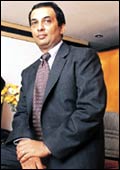 Ravi
Mehrotra Ravi
Mehrotra
41, Director & Chief Investment Officer,
Franklin Templeton Investments
The Accidental Fund Manager
Because he played a part in building India's
first and most successful private fund, that's why
He could have ended
up heading a market research agency-but a one-year stint at Marketing
and Business Associates motivated him to enroll in XLRI. He could
have worked in P&G-that's the job he landed after XL-but he
instead opted for a job with Bank of America, where he eventually
ended up in treasury operations. And he could have ended up in financial
services-post BankAm, he joined Prime Securities and grew it from
a Rs 20 lakh company to a Rs 30 crore one in two years-but chucked
it all up to join a start-up, Kothari Pioneer in 1993. "I joined
at a fraction my salary because the start-up couldn't afford much,"
remembers Mehrotra. "I took a big risk." It paid off:
Kothari Pioneer (later ITI Pioneer and now part of Templeton) emerged
the pioneer in India's nascent mutual fund industry. Says D. Babu,
who heads the personal finance research team at Cholamandalam Distribution
Services, "Pioneer ITI was the first to set up a fund in 1993,
The Blue Chip, that invested in large cap stocks. This set the trend
for other equity investments. The Blue Chip still remains a very
good record.'' Attribute part of that to Mehrotra's single-minded
focus. "You can never count him out on the golf course,"
says long-time friend Shreekant Pande, a director with the UK's
Newton Investment Management. Fore!
-Nitya Varadarajan
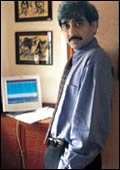 Darshan
Mehta Darshan
Mehta
41, President, Arvind Brands
The Loyal Troubleshooter
From accounting to advertising to durables to
garments, Mehta has seen it all and lives to tell the tale.
It started innocuously.
In 1985, Sanjay Lalbhai entered the family business and embarked
on an ambitious diversification exercise. First, he set off to acquire
Flying Machine, among the country's earliest jeans brands. He needed
some help to structure the deal, an acquaintance suggested he meet
with a Mumbai-based consultant with Price Waterhouse, Darshan Mehta,
and thus was born an association that spans 17 years. Lalbhai liked
the then 24-year-old Mehta's work and hired him. And Mehta, in his
own words, became, "a sort of roving ambassador whose services
were utilised to handle crises or tap opportunities." There
were enough of both. Mehta played his part in Arvind's diversifications
into consumer durables (Amtrex and Arvind Electronics) and financial
services (Anagram). He also helped turn around ad agency Trikaya-founder
Ravi Gupta was a close friend of Lalbhai-and even served on the
board of Trikaya-client Real Value (remember the Vaccumiser). "The
real caliber of a professional is a function of how he handles failures,"
says Mehta, who has had his share of them. "It takes guts to
bounce back." Predictably, when Arvind Brands floundered in
the face of competition from newer, more aggressive companies, it
was Mehta, Lalbhai turned to. He's due for a slice of luck.
-Venkatesha Babu
 Phaneesh
Murthy Phaneesh
Murthy
38, Former Head of Global Sales and Marketing,
Infosys
The Other Murthy
Allegations of sexual harassment haven't dimmed
Murthy's appeal to tech companies.
We'll keep this
simple. Most people reckoned that IIM-A alum Phaneesh Murthy would
one day head Infosys. Then came the sexual harassment suit over
which he resigned but there are several Indian it companies that
are willing to give an arm and a leg to have him on board. Not convinced?
"There are a number of companies out there that would be more
than happy to hire him as CEO," says Gautam Sinha of TVA Infotech.
Here's waiting for Phaneesh Murthy Ver 2.0.
-Venkatesha Babu
 Santrupt
Misra Santrupt
Misra
37, Director, Corporate Human Resources,
Aditya Birla Group
The HR-method Man
The trained academic has played a large part
in the transformation of the Aditya Birla group.
One office assistant,
one stenographer, and a run-down computer in a dingy basement"-that's
how Dr Misra remembers the hr department in the A.V. Birla Group
when he signed on as Group Vice President, hr, in 1996. Six years
on, and Misra is the youngest member after Chairman Kumarmangalam
Birla (35) on the board of the Rs 27,000-crore group and Birla is
happy with his hire, then a training manager in HLL. ''Dr Misra
has played a key role in raising our brand equity as a preferred
employer," says Birla. Along the way, the Aston Business School
and TISS academic has reshuffled portfolios, hired new faces, and
bid adieu to long-time Birla loyalists. The affable Misra, son of
an Oriya schoolteacher, has worked his way up, inch by inch in the
corporate world. And while success may have come early, he still
remains a simple village lad-he first went to a formal school only
in class 5. After all, how many hr heads you know still take their
old college professor out to dinner every Teacher's Day?
-Abir Pal
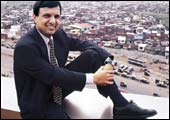 Nachiket
Mor Nachiket
Mor
38, Executive Director, ICICI Bank
The Patient Financier
Mor's larger quest to instill order in the world
has benefited his company.
CEO could have
been his middle name. first, there's the education bit: Nachiket
Mor has a MBA from IIM-A and a PhD in financial economics from U-Penn,
Philadelphia. Then there's experience: a short stint with a Philadelphia-based
hedge fund, Quantitative Financial Strategies, two tenures at ICICI,
including a recent, longish stint at treasury operations. Today,
Mor's responsibilities at the universal bank include managing relationships
with non-individual customers, treasury operations, finance, economics,
and derivatives research, and social initiatives. Finally, there's
his current obsession: leadership. "How do I build a self-sustaining,
replicating, organisation?" muses Mor, who is clearly set to
go places within ICICI. That could even be the top slot-after K.V.
Kamath.
-Roshni Jayakar
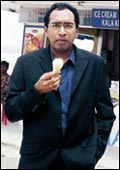 Sameer
Nair Sameer
Nair
37, COO, Star India
Soldier Of Fortune
Wasn't it Jack Welch who said "Control
Your Destiny or Someone Else Will?" Well, try telling Nair
that.
He's "not
the regular corporate guy". If he wasn't coo of Star India,
today's top dog in the channel business, Sameer Nair would probably
be making movies. Don't be deluded into thinking that his stint
in ad film-making is a natural precursor to this: Nair also studied
hotel management, dabbled in advertising, and sold hot dogs in suburban
Mumbai. It was in 1994 that Nair joined the Star Network, in charge
of Star Movies. By 1999, he was bored enough to consider a six-month
sabbatical to get back into film-making-this time with Amitabh Bachchan,
with whom the Economics graduate from Chennai University had struck
a fair rapport during his stint at the channel. Then, things started
happening at Star India. The management was shaken up, and Nair
suddenly found himself pitchforked as programming head of Star Plus.
The film would have to wait. The tryst with AB didn't have to. Kaun
Banega Crorepati started taking shape, and Nair insisted on getting
Bachchan hosting the show, although many at Star felt roping in
an "ageing superstar" wasn't the best way to go about
it. There was also the small matter of convincing AB, who wasn't
exactly brimming with enthusiasm. Long story cut short: KBC propelled
Star from No 3 to No 1. And it didn't end there: Pre-KBC Star Plus
had just 2-3 per cent viewership of Hindi Channels. Today it's around
80 per cent. "I want it to be 100 per cent,'' says Nair. Adds
Peter Mukerjea, CEO, Star India: "Sameer's a great ally, and
his biggest strength is his ability to combine people skills with
a conscientious approach to work." But Mukerjea better keep
an eagle eye on Nair. He still wants to make that movie. A photograph
of Steven Spielberg in his office serves a resolute reminder of
that dream.
-Brian Carvalho
 Vineet
Nayar Vineet
Nayar
41, President & CEO, HCL Comnet and Executive
Vice President, HCL Technologies
The Entrepreneurial Employee
Nayar's progress is proof that you don't have
to change companies to change jobs
He's
a HCL lifer but he has changed jobs several times. Vineet Nayar
couldn't have done that at HLL, the other company that made him
an offer on campus (XLRI, 1985). It's SA and the "promise of
a challenge" swung his choice in favour of HCL. He was promoted
five times in the first seven years, but by 1992, he was sure that
"this was not what I wanted to do". After a talk with
his mentor, HCL promoter Shiv Nadar, he spent 12 months in a brown
study before coming up with the idea for HCL Comnet, today a 600-people
Rs 200 crore company. By 1996, he was heading the start-up. And
he is part of the strategy think-tank behind HCL Technologies (he
also oversaw its hugely successful IPO in 2000). A workaholic by
choice, Nayar is now working on building a successful remote-managed
services industry out of India. "To create something,"
he grins, "you need to be compassionate within the organisation
and aggressive outside." Adds K. Pandiarajan, Managing Director,
Ma Foi, a Chennai-based head-hunting firm, "Vineet has imbibed
the strong entrepreneurial streak of Shiv Nadar and added to that,
his own institution-building capacity." It shows.
-Vinod Mahanta
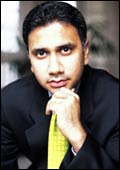 Salil
Parekh Salil
Parekh
38, CEO, CGE&Y India and COO, CGE&Y,
Asia Pacific
A Locational Advantage
Parekh believes success is a function of being
at the right place at the right time. He's done that in spades.
The first of august
was a lucky day for Parekh, a man who believes success is 95 per
cent luck. On that day, he was appointed Chief Operating Officer
of Cap Gemini Ernst & Young's Asia Pacific practice. That region
encompasses China, Australia, Japan, Singapore, Malaysia, and India
and accounts for revenues of $300 million (Rs 1,457 crore). If Parekh's
targets for CGE&Y in India are any indication, he can't wait
to get started: over the next three years he proposes to hike revenues
and workforce a staggering 12 times. The firm's it focus suits Parekh:
the aeronautical engineer from Indian Institute of Technology, Mumbai,
holds a masters degree in Computer Science from Cornell U, and co-founded
an India-based US-focused software firm, SoftTouch. Then came stints
with Coopers & Lybrand, and Ernst and Young in the US, before
he returned to India in 1999-a year before E&Y's consulting
arm and Cap Gemini merged-as head of E&Y Consulting. If Parekh's
plans work out, CGE&Y could become the largest multinational
consulting firm in India by 2005. And he is not leaving that to
chance.
-Abir Pal
 Bobby
Parikh Bobby
Parikh
38, Managing Director, CEO & Partner,
Ernst & Young
The Quiet Accountant
He survived Andersen, and ensured his colleagues
at the firm's Indian ops did too.
At his first meeting
after taking over as CEO of Arthur Andersen in 1998, baby-faced
Bobby Parikh needed to be prodded to admit that yes, he was the
new boss. A 17-year vet of the company-he signed on straight after
graduation and then worked on becoming a chartered accountant-Parikh
steered Andersen's Indian operations through the most troubled period
of its existence. Left to fend for itself-its parent was busy dealing
with paper shredders-the firm eventually merged with E&Y's Indian
arm. Through the crisis, the man ensured that the firm retained
its key employees . Parikh's non-aggressive demeanour is a big-plus
in an industry replete with big egos. "He comes across as a
mild person," says Ashok Wadhwa, CEO, Ambit Finance, and the
man who hired Parikh in 1996, "but he is driven by a great
sense of determination; the aggression is not in his personality,
but in his manner of working." That's a bonus.
-Seema Shukla
1
2 3
|

